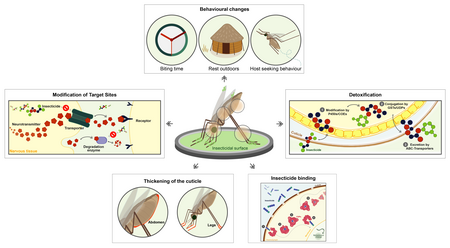Malaria: From bench to bedside
The use of insecticides has been very successful in controlling the transmission of malaria pathogens over the past decades. However, this success is threatened by the widespread and intense levels of insecticide resistance in Anopheles mosquitoes, which transmit malaria. The working group of Victoria Ingham is investigating the impact of insecticide resistance and insecticide exposure within the major malaria vector, Anopheles coluzzii, on its competence to transmit malaria parasites. The scientists aim to use bioinformatics and molecular biology methods to characterize the impact of metabolic pathways and genes that are essential for insecticide resistance status, and to determine if vector competence is impacted by these genes.
In many parts of the world, insecticides are used in public health interventions to control infectious diseases transmitted by insect vectors, particularly mosquitoes. Insecticide-based interventions such as insecticide-treated bed nets and indoor spraying with insecticides have shown great success, leading to a more than 80 percent decline in malaria incidence worldwide from 2000 to 2015. However, the widespread use of insecticides also leads to strong selection pressure on mosquitoes and thus to high rates of insecticide resistance.
The research group led by Victoria Ingham aims to investigate the impact of insecticide resistance of the major malaria vector Anopheles coluzzii on vector competence, i.e., the ability of Anopheles coluzzii mosquitoes to be infected, maintain and transmit pathogens. In particular, the researchers aim to characterize how the resistance phenotype of multiresistant Anopheles coluzzii populations affects Plasmodium development and transmission of the malaria parasite to humans. Changes in mosquito biology and potentially prolonged exposure to indoor insecticide residues are likely to have tremendous implications for the development of malaria parasites within the mosquito vector. Using bioinformatics and molecular biology methods, the scientists are working to identify metabolic pathways and genes important to these processes and characterize their role in the emergence of the two most essential phenotypes—vector competence and insecticide resistance status.
In summary, the research of the group focuses on three main objectives:
- Characterize the impacts of the insecticide resistance phenotype and indoor residual spray compounds on Plasmodium carriage in multiresistant Anopheles coluzzii populations.
- Determine changes in the redox biology of resistant mosquitoes due to the insecticide resistance phenotype and Plasmodium infection.
- Analyze whether manipulation of expression of insecticide resistance-related genes impacts vector competence.
In addition, the group plans to sequence the whole genomes of five resistant Anopheles populations from Burkina Faso to identify genetic markers of resistance.





